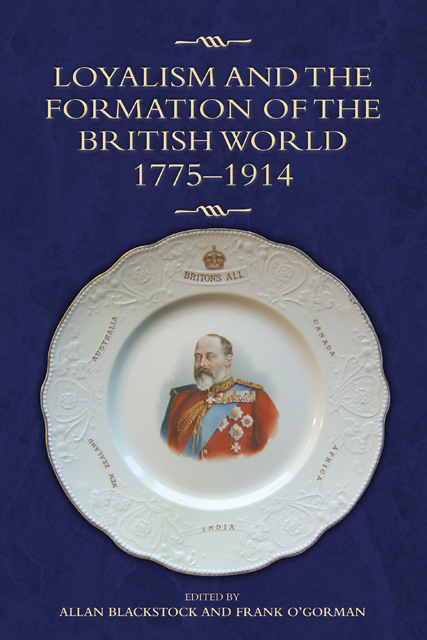Book contents
- Frontmatter
- Contents
- Notes on Contributors
- 1 Loyalism and the British World: Overviews, Themes and Linkages
- 2 Origins and Trajectories of Loyalism in England, 1580–1840
- 3 The ‘Spirit of Loyalty’: Material Culture, Space and the Construction of an English Loyalist Memory, 1790–1840
- 4 Anti-Catholicism and Orange Loyalism in Nineteenth-Century Britain
- 5 Loyalty and the Monarchy in Ireland, c.1660–c.1840
- 6 The Trajectories of Loyalty and Loyalism in Ireland, 1793–1849
- 7 Presbyterians, Loyalty and Orangeism in Nineteenth-Century Ulster
- 8 Unionists and Patriots: James Whiteside, the Irish Bar and the Dilemmas of the Protestant Nation in Victorian Ireland
- 9 Loyalism in British North America in the Age of Revolution, c.1775–1812
- 10 ‘A Colonial Hybrid’: Nineteenth-Century Loyalism as Articulated by the Orange Order in the Maritime Colonies of British North America
- 11 Canadian Catholics, Loyalty, and the British Empire, 1763–1901
- 12 Loyalism in Australasia, 1788–1868
- 13 ‘We love one country, one queen, one flag’: Loyalism in Early Colonial New Zealand, 1840–80
- 14 Clientelism, Community and Collaboration: Loyalism in Nineteenth-Century Colonial India
- Select bibliography
- Index
8 - Unionists and Patriots: James Whiteside, the Irish Bar and the Dilemmas of the Protestant Nation in Victorian Ireland
Published online by Cambridge University Press: 28 February 2023
- Frontmatter
- Contents
- Notes on Contributors
- 1 Loyalism and the British World: Overviews, Themes and Linkages
- 2 Origins and Trajectories of Loyalism in England, 1580–1840
- 3 The ‘Spirit of Loyalty’: Material Culture, Space and the Construction of an English Loyalist Memory, 1790–1840
- 4 Anti-Catholicism and Orange Loyalism in Nineteenth-Century Britain
- 5 Loyalty and the Monarchy in Ireland, c.1660–c.1840
- 6 The Trajectories of Loyalty and Loyalism in Ireland, 1793–1849
- 7 Presbyterians, Loyalty and Orangeism in Nineteenth-Century Ulster
- 8 Unionists and Patriots: James Whiteside, the Irish Bar and the Dilemmas of the Protestant Nation in Victorian Ireland
- 9 Loyalism in British North America in the Age of Revolution, c.1775–1812
- 10 ‘A Colonial Hybrid’: Nineteenth-Century Loyalism as Articulated by the Orange Order in the Maritime Colonies of British North America
- 11 Canadian Catholics, Loyalty, and the British Empire, 1763–1901
- 12 Loyalism in Australasia, 1788–1868
- 13 ‘We love one country, one queen, one flag’: Loyalism in Early Colonial New Zealand, 1840–80
- 14 Clientelism, Community and Collaboration: Loyalism in Nineteenth-Century Colonial India
- Select bibliography
- Index
Summary
James Whiteside (1804–76) is remembered as a leading lawyer-politician of the mid-Victorian Irish Conservative party, one of the last great exponents of the tradition of Irish classical oratory dating back to the eighteenth-century Irish parliament, and a judge who displayed more Protestant-conservative bias than legal acumen. He was born in Delgany, County Wicklow on 12 August 1804. His father, a Church of Ireland clergyman, died in 1806 and James was brought up in somewhat reduced circumstances and on Evangelical principles by his mother. He was deeply impressed by the example of his guardian, the historian and statistician Rev. James Whitelaw, who died of disease contracted while attending the sick. Whiteside’s professional and political career reveals a distinctive strand of loyalism which venerated aspects of Ireland’s eighteenth-century patriot legacy. While Whiteside’s view of the Church of Ireland as coterminous with the corporate existence of the true Irish nation occasionally led him to suggest that disestablishment would absolve Irish Protestants from loyalty to Britain, and he self-consciously drew on the oratorical legacy of the Irish Parliament in his own career, he saw contemporary loyalism not as a betrayal of the patriot legacy but as its fulfilment through participation in the providentially determined British project of disseminating Protestantism and constitutional liberty. For Whiteside, tension between the conditional loyalty associated with the ultra-Protestant view that the British government could only be trusted insofar as it upheld Protestant ascendancy, and the conservative-Burkean view that liberty was best upheld by practical administrators within a responsible government, would always ultimately be resolved in favour of the latter. This article explores Whiteside’s career in relation to the ambivalent contemporary image of the lawyer-politician, and analyses his occasional writings to show how Whiteside combined political Protestantism and Peelite administrative reformism to argue that the best interests and traditions of the Irish Protestant nation were bound up with the British constitution and fulfilled through access to Westminster, and the prospect of reviving Grattan’s Parliament was an attractive but irresponsible dream.
In late eighteenth and nineteenth-century Ireland public-speaking – the sermon, the bar, the lecture, the hustings – was a major form of popular entertainment. High-profile lawyers became celebrities.
- Type
- Chapter
- Information
- Loyalism and the Formation of the British World, 1775-1914 , pp. 145 - 162Publisher: Boydell & BrewerPrint publication year: 2014

